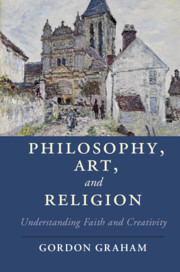1 - Art, Religion, and the Aesthetics of Everyday Life
Published online by Cambridge University Press: 06 August 2018
Summary
Reweaving the Rainbow
For several decades, the cultural world of Europe and North America has been marked, dominated, it might be said, by the “clash” between religion and science. A recurrent theme of much discussion in newspapers, radio, television, and online is whether the rise of science inevitably means the decline of religion. As the use of “rise” and “decline” suggests, these apparently related phenomena are easily viewed as just two sides of one coin. Science, it is commonly held, at both the level of theoretical explanation and of practical manipulation, has proved to be far more successful at doing what in the past the Christian religion (and religion more generally perhaps) claimed to be able to do. Modern science, this view of the matter contends, offers far better explanations of the physical world, the biological world, and the social world than the theological stories about creation, providence, and miracles we find in the Bible. Still more importantly, by producing technologies that give human beings much greater control over their lives and prospects than prayers and rituals ever did, science has fundamentally altered the human condition. We don't need God (or the gods) anymore, because thanks to technology we can protect ourselves from the elements, literally dispel the terrors of the night (with artificial light), and, by using modern methods of transportation, eliminate most of the dangers historically associated with travel. Medical science, too, has played an important part in this change, rendering redundant archaic spells and petitionary prayers for healing. Of course, these age-old practices persist. In reality, however, or so this new scientific enlightenment claims, the superiority of medicine is acknowledged even by people who cannot quite bring themselves to let go of their religious beliefs. Modern “believers” still offer up prayers of healing certainly, but this does not lead them to abandon drugs, physicians, and medical research, in which, in truth, they actually place far greater hope.
If this way of seeing things is correct, then it does make the rise of science/ decline of religion idea very plausible. Given that religion and science are competitors, huge scientific advances such as there have undoubtedly been, on two fronts – the explanatory and the practical – must mean that religion inevitably, and ever more rapidly, is forced to beat a retreat.
- Type
- Chapter
- Information
- Philosophy, Art, and ReligionUnderstanding Faith and Creativity, pp. 1 - 31Publisher: Cambridge University PressPrint publication year: 2017

